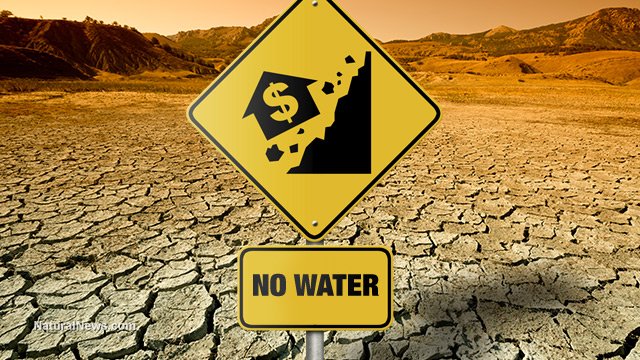American Food Supply in Slow Collapse/ Government Continues Junk Food Subsideis, Ignores Immigration Crisis
(NaturalNews)
America isn't growing enough fresh produce to meet its needs, according to recent data released by the Department of Agriculture's Economic Research Services, with just 1.65 cups of vegetables available per person per day as of 2013, though dietary guidelines recommend a daily consumption of 2.5 to 3 cups.
As reported by National Public Radio (NPR), and posted at GovernmentSlaves.info, even worse is the fact that the supply of available produce has been falling since 2000, and it's getting worse in part due to the federal government's subsidizing of junk food and increased immigration into the country.
The amount of available veggies per day for Americans peaked at about 1.80 cups as the world entered the 21st century, but since then the supply has fallen some 15 percent to its current level in 2013, the latest data available. The Department of Agriculture's figures include both domestically grown and imported produce.
As further reported by GovernmentSlaves.info:
"Around 50 percent of the vegetables currently available in the United States are potatoes and tomatoes, and most people consume those in unhealthy forms such as ketchup, French fries and pizza, the report said. The third most common vegetable was lettuce."
"The USDA does not support 'specialty crops' [such as vegetables] to any appreciable extent and the Department of Commerce's figures show that the relative price of fruits and vegetables has gone up much faster than that of fast food or sodas," Haynes Maslow said.
Though the federal government asks Americans to eat healthy food, it nevertheless is subsidizing other crops — such as corn and soybeans — "that end up in cheaper, less healthy processed food," the radio network reported.
So far, the deepening drought in California has not caused produce prices to rise, according to NPR, but it is nonetheless putting pressure on the state's agricultural industry, and that's bad news for the country given that California is the nation's top grower.
According to a study by the University of California-Davis, the multi-year drought is having its greatest effect on groundwater supplies, and researchers noted that as the dry weather continues, "the nation's produce basket may come up dry in the future if it continues to treat those reserves like an unlimited savings account."
As a press release from the University noted:
"The study found that the drought — the third most severe on record — is responsible for the greatest water loss ever seen in California agriculture, with river water for Central Valley farms reduced by roughly one-third."
The study predicted that groundwater use would replace most river water losses and that some regions would double their pumping over the previous year. More than 80 percent of the replacement pumping took place in the San Joaquin Valley and Tulare Basin.
"California's agricultural economy overall is doing remarkably well, thanks mostly to groundwater reserves," said Jay Lund, a co-author of the study and director of the University's Center for Watershed Sciences. "But we expect substantial local and regional economic and employment impacts. We need to treat that groundwater well so it will be there for future droughts."
In addition, the state's large immigrant population is also putting additional stress on water supplies, some have argued.
Sources:
GovernmentSlaves.info
NPR.org
KCRA.com
America isn't growing enough fresh produce to meet its needs, according to recent data released by the Department of Agriculture's Economic Research Services, with just 1.65 cups of vegetables available per person per day as of 2013, though dietary guidelines recommend a daily consumption of 2.5 to 3 cups.
As reported by National Public Radio (NPR), and posted at GovernmentSlaves.info, even worse is the fact that the supply of available produce has been falling since 2000, and it's getting worse in part due to the federal government's subsidizing of junk food and increased immigration into the country.
The amount of available veggies per day for Americans peaked at about 1.80 cups as the world entered the 21st century, but since then the supply has fallen some 15 percent to its current level in 2013, the latest data available. The Department of Agriculture's figures include both domestically grown and imported produce.
As further reported by GovernmentSlaves.info:
"Around 50 percent of the vegetables currently available in the United States are potatoes and tomatoes, and most people consume those in unhealthy forms such as ketchup, French fries and pizza, the report said. The third most common vegetable was lettuce."
Produce prices rising faster than junk food we pay for with tax dollars
"What I see here with lots of potatoes, tomatoes and lettuce ... [is] that people are used to these items, and habits are hard to break," Lindsey Haynes Maslow of the Union of Concerned Scientists told NPR, according to its web site."The USDA does not support 'specialty crops' [such as vegetables] to any appreciable extent and the Department of Commerce's figures show that the relative price of fruits and vegetables has gone up much faster than that of fast food or sodas," Haynes Maslow said.
Though the federal government asks Americans to eat healthy food, it nevertheless is subsidizing other crops — such as corn and soybeans — "that end up in cheaper, less healthy processed food," the radio network reported.
So far, the deepening drought in California has not caused produce prices to rise, according to NPR, but it is nonetheless putting pressure on the state's agricultural industry, and that's bad news for the country given that California is the nation's top grower.
According to a study by the University of California-Davis, the multi-year drought is having its greatest effect on groundwater supplies, and researchers noted that as the dry weather continues, "the nation's produce basket may come up dry in the future if it continues to treat those reserves like an unlimited savings account."
Immigrants, too?
The University's Center for Watershed Sciences, which released its study in July 2014, updated previous estimates on the drought's effects on the Central Valley farm production. The study presents new data on California's coastal and southern farm areas as it seeks to forecast the drought's economic fallout through next year.As a press release from the University noted:
"The study found that the drought — the third most severe on record — is responsible for the greatest water loss ever seen in California agriculture, with river water for Central Valley farms reduced by roughly one-third."
The study predicted that groundwater use would replace most river water losses and that some regions would double their pumping over the previous year. More than 80 percent of the replacement pumping took place in the San Joaquin Valley and Tulare Basin.
"California's agricultural economy overall is doing remarkably well, thanks mostly to groundwater reserves," said Jay Lund, a co-author of the study and director of the University's Center for Watershed Sciences. "But we expect substantial local and regional economic and employment impacts. We need to treat that groundwater well so it will be there for future droughts."
In addition, the state's large immigrant population is also putting additional stress on water supplies, some have argued.
Sources:
GovernmentSlaves.info
NPR.org
KCRA.com

